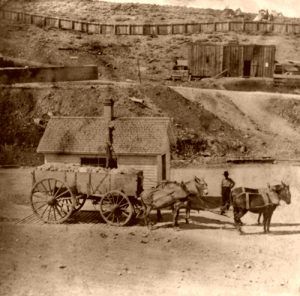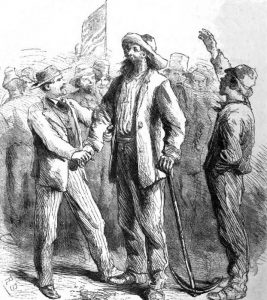By William Daugherty in 1891
Nevada’s pioneers were in many respects, all alike; in this at least, they all merited fame and fortune for the risk they took; the majority of them are still nearer alike, in another respect, and that is, that the most of them missed both. Still, there is not one, yet alive, but enjoys a sweet morsel of satisfaction in the fact of being one of the venturesome band who aided in exploring the arid wastes that yielded so many millions of treasure at a time when it was so badly needed. Many who made the most have gone to the grave with the least, and among them, none perhaps had more flattering prospects than David E. Buel, whose mining operations were principally confined to the eastern part of the State.
It is not the intention here to repeat his history but merely to refer to a few incidents in his Nevada career to show the man’s irrepressible nature. In disposing of mining properties, he made many trips to the eastern states, at a time when the ride was all by stage as far as Omaha, Nebraska; and he also made a number of trips to Europe, and in nearly all cases, he was successful. On one of his eastern trips, after he had started on the road to a dividend-paying property, he told a Gazette reporter, while he was packing an old well worn sole-leather trunk, as he closed and sat down upon it to fasten the straps, that it had journeyed with him eight times across the Atlantic, and altogether had traveled 96,000 miles with him on his various journeys. He was a rustling, energetic man, never satisfied without more irons in the fire at once than he could watch, and irresistible in his purpose to accomplish whatever he aimed at. This trait of character was well illustrated on his first visit to London and Paris. He was an utter stranger to Europe and traveled without a companion and to make his immense stature, of 6 feet, 4 inches, still more conspicuous, he wore a very long-skirted overcoat made of a yellow blanket and ornamented with silver buttons of very large size, on each of which was engraved his monogram. With a pair of number 12 boots, and a number six hat which he frequently called attention to, he was an object to attract attention even in the remote mining camps of Nevada, and when alone in a crowd in a London fog, or strolling along the boulevards of Paris, he received more attention than if his head had borne a crown.
During his first visit to Paris, attired in the above manner, he learned of a grand review of troops to be held for the Emperor and inquiring where it could best be seen, Buel started for as he termed it, the Imperial circus. Arriving on the ground, he found the crowd so great that no near view could be had unless some point of vantage could be secured. A little observation disclosed in the middle of the review grounds, a small park, enclosed with a low iron picket, and what interested Buel most, it was not occupied. Fearing he would be too late, he asked no questions and pressing through the crowd, before the troops appeared, he strode across the parade ground, with his blanket overcoat and silver buttons glittering like regalia, making for his chosen point of vantage. As soon as the crowd discovered his object, they set up a cry of “Vive la American” and cheered vociferously. When Buel reached the little park, he did not stop to look for a gate, for he was in haste and expected it to be filled in short order by the crowd, so he stretched his long legs over the fence and, as he said, made the first location, and turned to watch the scene.
He was all alone, and much to his surprise, none were following him. He was just congratulating himself on the march he had stolen when he was notified by the cheering of the crowd of the appearance of the Emperor and his staff richly mounted and with gorgeous trappings riding directly toward him. Buel stood, very much interested, taking in the good points of the horses and riders when they halted, and the emperor raised his hat and smiled at him. Buel was too much interested to discern what it meant until an Aide-de-Camp rode forward toward him, saluted and spoke in French words, which Buel knew not the meaning of; but with sturdy western independence, Buel said, “Spit it out young fellow, I don’t know what you are saying.” With this, the Aide told him in choice English that he was occupying the Emperor’s private review stand, and they were waiting for him to vacate. Buel said that he wasn’t long in doing so either and was well satisfied with the distinguished consideration bestowed upon him in a bow from the Emperor.
By William Daugherty, for the Reno Evening Gazette, February 24, 1891. Compiled and edited by Kathy Weiser/Legends of America, updated January 2021.
About the Author: Written by William Daugherty wrote for the Reno Evening Gazette in 1891. The Gazette was first published on October 12, 1876, and continued for the next 107 years. In 1977, it was merged with the Nevada State Journal and continues to exist today as the Reno Gazette-Journal.
Note: The article is not verbatim as spelling errors, minor grammatical changes, and editing have occurred for the ease of the modern reader.
Also See:
Pioneers on the Nevada Frontier (Reno Evening Gazette)
Tales of the Overland Stage (Reno Evening Gazette)
Nevada Mining Tales (Reno Evening Gazette)


